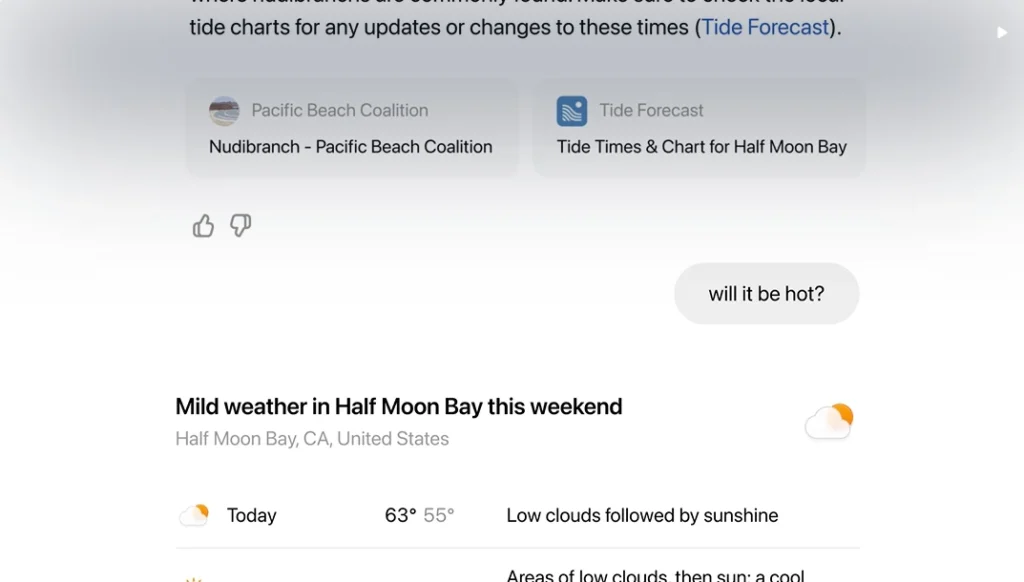As popular search engines like Google have dominated the market for decades, the emergence of SearchGPT signals a potential shift in how we access and interact with information online.
But what exactly sets SearchGPT apart from the search engines we’ve grown accustomed to?
In this article, we’ll dive deep into the differences between SearchGPT and traditional search engines, exploring their search features, the impact of AI, and what this means for the future of search.
Table of Contents
What Is SearchGPT?
SearchGPT is an innovative AI-powered search engine prototype designed to revolutionise the way we find information online.
Unlike traditional web-based search engines that rely on algorithms to index and rank web pages based on keywords and links, SearchGPT leverages advanced natural language processing (NLP) and machine learning models to understand and generate human-like responses to search queries.
Launched as a limited prototype, SearchGPT aims to deliver more accurate and contextually relevant search results by interpreting the intent behind user queries rather than just matching keywords.
This approach allows SearchGPT to provide answers that aren’t only more precise but also tailored to the specific needs of the user, positioning it as a strong alternative to Google and other traditional search engines including Microsoft Bing and Brave Search.

How SearchGPT Works
At the core of SearchGPT is a powerful AI engine that processes search queries in real time.
When you enter a search query into SearchGPT, the AI model analyses the input, interprets the underlying intent, and generates a response that directly addresses the query.
This is in stark contrast to traditional search tools, which typically present a list of links to web pages that may or may not contain the information you’re looking for.
One of the standout features of SearchGPT is its ability to deliver results that are conversational in nature.
Instead of sifting through multiple web pages, users receive a concise, relevant answer directly from the search interface.
This not only saves time but also enhances the overall search experience by reducing the need to navigate through irrelevant content on a results page.
Furthermore, SearchGPT is designed to integrate real-time data into its responses, ensuring that users have access to the most up-to-date information available.
This capability is particularly beneficial for queries related to current events, where the accuracy and timeliness of information are crucial.
In contrast, traditional search engines like Google and Microsoft Bing often rely on periodically updated indexes, which may not always reflect the latest information.

SearchGPT vs. Traditional Search Engines: A Comparative Analysis
When comparing SearchGPT to traditional search engines including Google, several key differences emerge. Let’s explore these differences in greater detail:
Search Features and User Experience
Traditional search engines rely on a combination of algorithms, indexing, and ranking systems to generate search results.
These engines analyse factors like keyword density, backlinks, and page authority to determine the relevance of web pages to a given query.
The results are typically presented as a list of links on a results page, with the most relevant pages appearing at the top.
SearchGPT, on the other hand, bypasses the need for link-based results by generating direct answers to user queries. This approach transforms the web search experience into a more interactive and intuitive process, where users can ask questions and receive clear, concise responses without needing to leave the search page.
Additionally, SearchGPT’s AI-driven approach allows for a more personalised search experience.
By understanding the context and nuances of a query, SearchGPT can tailor its responses to better align with the user’s intent, something that traditional search engines often struggle to achieve.
This personalised experience is particularly appealing in regions like South Korea, where users are increasingly seeking search tools that deliver relevant results quickly and efficiently.
Real-Time Information Integration
One of the most significant advantages of SearchGPT is its ability to incorporate real-time information into search results. Traditional search engines often rely on periodically updated indexes, meaning that the information presented might not always be the most current.
For example, news articles or recent updates to a web portal might take time to appear in search results.
SearchGPT, however, is designed to pull in real-time data as it processes queries, ensuring that users receive the latest information available.
This is particularly important in fast-moving fields like news, finance, and social media, where the timeliness of information can make a significant difference.
SearchGPT and Google: Key Differences
While both SearchGPT and Google aim to help users find information quickly and efficiently, their methods differ significantly. Google’s search engine is built on a foundation of web crawling, indexing, and ranking, with a strong emphasis on backlinks and page authority.
This method has proven effective for years but can sometimes lead to information overload, where users are presented with too many irrelevant results.
SearchGPT, as an AI search engine, focuses on delivering precise, contextually relevant answers to user queries. This reduces the need for users to navigate through multiple pages of results, streamlining the search process.
Moreover, SearchGPT’s integration of real-time data gives it an edge in scenarios where up-to-the-minute information is critical, positioning it as a compelling alternative to Google.
Additionally, as the search market continues to evolve, SearchGPT could challenge Google’s dominance. Google currently holds the largest market share among search engines.
With its unique AI-driven capabilities and real-time data integration, SearchGPT is poised to attract users looking for a more dynamic and responsive search experience.
AI-Driven Search Capabilities
The AI capabilities of SearchGPT represent a significant departure from the traditional search engine model.
While Google and Microsoft Bing have incorporated AI into their algorithms to enhance search accuracy (e.g., Google’s RankBrain and Bing’s AI-driven search features), SearchGPT takes this a step further by using AI to generate human-like responses in real-time.
This AI-driven approach allows SearchGPT to understand complex queries, disambiguate terms with multiple meanings, and provide answers that are more aligned with the user’s intent.
As AI technology continues to evolve, SearchGPT is likely to become even more adept at understanding and responding to nuanced queries, setting a new standard for search engines and increasing its market share.
Implications for SEO and Content Creation
The rise of SearchGPT has significant implications for search engine optimization (SEO) and content creation. Traditional SEO strategies often focus on optimisng web pages for specific keywords to rank higher in search results.
However, with SearchGPT’s focus on direct answers and real-time information, content creators may need to adapt their strategies to ensure their content is still discoverable.
This could mean placing greater emphasis on creating content that directly answers common questions within their niche or ensuring that their content is easily accessible and can be integrated into AI-generated responses.
Additionally, partnerships between content creators and platforms like SearchGPT could become more common as publishers seek to ensure their content is prominently featured in AI-driven search results.
Looking Ahead: The Future of Search with SearchGPT
As SearchGPT continues to evolve, it’s clear that it has the potential to reshape the search landscape in profound ways.
Traditional search engines like Google will probably not disappear soon. But the introduction of AI-driven search engines like SearchGPT will change how we interact with and find information online.
SearchGPT is different from its predecessors because it can give answers right away, in a personalised way, and in the right place. This gives us a look into what search technology will be like in the future.
As more users and developers explore the capabilities of SearchGPT, we can expect to see further innovations and refinements that’ll continue to push the boundaries of what search engines can achieve.

Final Thoughts
SearchGPT represents a significant leap forward in search engine technology. Its AI-driven approach, combined with real-time information integration and a focus on delivering precise answers, offers a compelling alternative to Google and other traditional search engines.
While Google and other major players like Microsoft Bing have long dominated the search market, SearchGPT’s unique features and capabilities suggest that we may be on the cusp of a new era in how we search for and interact with information online.
As AI technology continues to advance, the differences between SearchGPT and traditional search engines will become even more pronounced, potentially leading to new opportunities and challenges for users, content creators, and the broader digital landscape.
Whether you’re a casual user or a seasoned SEO professional, staying informed about these developments is crucial as we navigate the future of search.
Related Posts

Why “Best SEO Tools” Lists Are Actually Bad SEO (And What To Do Instead)
Everyone’s publishing “Top SEO Tools” roundups. And almost none of them rank.
Let’s get real: the web is overflowing with “Top 10 Tools for SEO” blog posts, each trying to outdo the last with minor tweaks and new affiliate links.

Stop Writing SEO Content – Start Designing It
Let’s be honest.
Most SEO content is built like an old textbook – walls of text, a few H2s, maybe a CTA if you’re lucky.
But your audience isn’t reading. They’re scrolling.

Why You Shouldn’t Update Every Old Blog Post
(And What to Do Instead) Table of Contents If you’ve been in SEO long enough, you’ve probably heard this advice on repeat: “Keep your content

6 responses